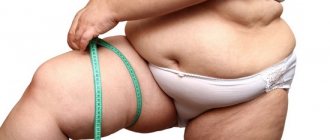Feeling hungry is a signal that the body requires energy. However, if such a condition is constantly annoying, then the situation should be of concern. Let's figure out what appetite depends on.
Cost of endocrinologist services in our clinic
| Appointment with an endocrinologist with the highest category | 1500 rub. |
| Consultative appointment with a doctor based on test results and ultrasound results | 500 rub. |
| Ultrasound of the thyroid gland with regional lymph nodes in standard mode and using Doppler techniques | 1000 rub. |
| Soft tissue biopsy | 2500 rub. |
| Taking blood from a vein | 170 rub. |
| Make an appointment by phone: 8-800-707-15-60 (toll-free) | |
| *The clinic is licensed to remove tumors |
Appetite is the most common effect of lowering blood sugar concentrations.
How the process works
The content of the article
Information about insufficient glucose levels reaches the brain, which controls the release of neuropeptides responsible for the need for food and metabolic rate.
Hormones of the intestinal tract play an important role in regulating appetite. They are released through the walls of the small intestine.
For example:
- cholecystokinin gives a feeling of satiety;
- insulin produced in the pancreas is responsible for the metabolism of glucose and also stimulates the secretion of leptin by adipose tissue, which suppresses excess cravings for food;
- during fasting, the concentration of gremlin increases;
- Serotonin and dopamine, the so-called happiness hormones, produced in the brain suppress the desire to snack, especially sweets.
Problems begin when metabolic processes begin to be disrupted.
A new approach in dietetics: the problem of appetite in the light of the theory of functional systems
author: I. E. Reif writer, publicist, Germany, Frankfurt am Main
During my student years I happened to end up in a hospital. And I remember how my roommate, an elderly, haggard-looking man, when he had an appetite, said, wincing in pain: “I don’t know what to eat.” And he glanced doubtfully at the refrigerator. At that time it seemed funny to me: if I really wanted to eat, then what’s the problem?
about the author
Doctor, journalist, writer Igor Evgenievich Reif was born in 1938 in Moscow.
In 1963 he graduated from the 1st Moscow Medical Institute (currently the First Moscow State Medical University named after I.M. Sechenov), in 1975–1980. worked as the head of the department of the Country Rehabilitation Clinic of the 1st MMI (currently the Center for Rehabilitation Medicine and Rehabilitation of Moscow State Medical University). Since 1998 he has lived in Germany.
He began publishing in the perestroika and post-perestroika years. Author of the books “The Tale of an Unfamous Graduate of Moscow State University”, “Recreation Technology”, “Geniuses and Talents”, “The Thought and Fate of the Psychologist Vygotsky”, “Biosphere and Civilization: in the Grip of the Global Crisis” (co-authored with V. I. Danilov- Danilyan), “The Biosphere and Civilization: Social and Natural Dimensions of the Global Crisis” (with VI Danilov-Danilyan), as well as a series of articles in the journals “Science and Life”, “Knowledge is Power”, etc.
The theory of functional systems is a model that describes the structure of human and animal behavior, created by Academician P.K. Anokhin, the largest neurophysiologist of the 20th century.
Functional systems, according to Anokhin, are self-organizing functional formations, united by nervous and humoral regulations and contributing to the achievement of results beneficial to the body, necessary for its adaptation to the environment.
According to information: Ivanov V.P., Ivanova N.V., Polonikov A.V.
Medical ecology: a textbook for medical universities / edited by. ed.
V. P. Ivanova. - St. Petersburg, 2012.
What is appetite?
Appetite (from Latin appetitus) is an emotional urge to consume certain food in the form of a deliberate experience of pleasure from the upcoming meal.
The emotion of appetite differs from the subjectively unpleasant feeling of hunger in its positive nature, although both sensations are based on nutritional need. Appetite is considered as an important psychophysiological factor in the regulation of eating behavior in the direction of selective consumption of substances necessary for the body, for example, salt when there is a lack of it in the body, carbohydrate foods when mobilizing energy resources, etc.
According to information: “Medical Encyclopedia”, dic.academic.ru.
I also remember another bewilderment of those years. At the Department of Physiology, we, future doctors, were taught: the digestion process begins in the mouth. Here the food is crushed and moistened with saliva. This is where the process of assimilation of easily broken down carbohydrates begins, which is affected by the enzyme ptyalin contained in saliva. True, in the acidic environment of the stomach, its activity quickly disappears. So what, one might ask, is it needed for? As a result, there was a feeling that something very insignificant was happening in the mouth from a physiological point of view, almost unworthy of attention. After all, food that requires chewing will not get into the stomach anyway, so why talk about self-evident things? Well, the one that doesn’t require soup, thin porridge, a soft-boiled egg doesn’t seem to need chopping and wetting. Swallow it and the whole conversation.
However, in this state of affairs presented here, I felt a certain injustice. For ordinary living people, digestion not only begins, it actually ends in the mouth. And what happens to the swallowed bolus of food, in fact, no longer concerns us. While we eat - bite, chew, swallow - we are certainly in the power of this process. But then the last spoon is eaten, the last piece is chewed, and what happens there in the darkness of the body - physiologists and biochemists know this well. We, mere mortals, blithely get up from the table and go about our business until another bout of hunger reminds us of our “main concern.”
Knowledge that is on the tip of the tongue
Academician I.P. Pavlov established: hunger is different from hunger. Different foods require different sets of digestive enzymes, and if, say, meat secretes juice with a high concentration of pepsin, then the picture is completely different when digesting bread or potatoes. For an omnivore, the last point, by the way, is especially relevant. After all, both “pure” carnivores - predators, and “pure” vegetarians - elephants, monkeys, ungulates - food is more or less homogeneous in nature and does not require any special adjustment of the digestive apparatus.
And a completely different matter is a person. Try teasing your tablemate with some deliciously fried steak, and then slip him a bowl of porridge cooked in water. I assure you, the thin porridge will form a lump in his throat, no matter how hungry he is. Yes, from steak to semolina porridge - this is the range of nutrition of a modern person. This is his strength, but this is also his weakness. Because omnivory, on the one hand, opens up for him the broadest opportunities for maneuver, for adaptation to certain specific living conditions, which, naturally, includes the possible set of products available to him. But on the other hand, such a variety of nutritional diet requires constant, and very subtle, adjustment of the digestive apparatus in relation to the characteristics of each specific type of food. In this case, a special role is played by the physiological readiness to assimilate it, which is subjectively reflected not so much by the feeling of hunger as by the presence of appetite.
People of the older generation, who drank from a hungry wartime childhood, are accustomed to treating appetite with some suspicion. Like, what kind of whim is this, born of the current availability of food? A truly hungry child will gladly eat everything in a row and without any pickles.
Alas, not everything is so simple. A healthy child is really able to quickly adapt and, if he is denied the desired dish, will happily be content with bread and potatoes. Well, what if we have a person in front of us who is not completely healthy or very tired (which, in principle, is not too different from one another), whose adaptive capabilities are currently significantly limited?
In Fyodor Abramov’s novel “Two Winters and Three Summers” there is a remarkable episode that could not help but be remembered by everyone who read it at least once. In the harsh post-war winter, the eldest of his sons, Timofey Pryaslin, returns from German captivity to his native village of Pekashino, lost in the dense Pinega forests. He returns not only extremely exhausted, but also sick (as it turns out later, with stomach cancer). And at home at this time there is only raw chaff bread and potatoes. And the very first serious conflict that breaks out in the family at the table is connected with a seemingly innocent question that this cornered man timidly asks his family: “Is there any milk?” For them, who do not see this milk for months, handing over everything for agricultural supplies, this question sounds like a daring attack. He himself understands this in his soul, but what to do if his stomach does not accept this stale, heavy bread and last year’s sprouted potatoes? But how does Timofey Pryaslin, who is not knowledgeable in medicine, and especially in gastrophysiology, know that in his current state he needs milk?
Let's start with the fact that a person who has never tasted milk at a reasonable age will not ask for it. To do this, it is necessary that in his memory not only the taste impression of a given product is preserved, but also those often subconscious sensations that are associated with its deeper assimilation. And no matter how carefree we may be about the food we eat, still each of us in most cases (although not always) can say what he wants and doesn’t want at the moment. And this knowledge is at the tip of our tongue.
The body works ahead
We all remember a Pavlovian dog with a gastric fistula, which, in response to a conditioned signal - a bell or a flash of light - begins to secrete gastric juice in advance, when there is no food in front of it. That is, the body functions here as if ahead of schedule. But this is a normal conditioned reflex. In reality, everything is much more complicated, and, as our outstanding neurophysiologist Academician P.K. Anokhin showed, the human and animal body not only works ahead of the curve, it anticipates the results of its own activity in its nervous system.
For example, we anticipate the weight of a carafe of water that we are about to lift, and tense our muscles accordingly. And by putting our hands through the sleeves of our shirt - an example that Anokhin especially often liked to give in his lectures - on the contrary, we subconsciously focus on the ease and unhinderedness of this automatic action. What if someone tries to sew up the sleeves unnoticed? The reaction in this case - due to the sharp discrepancy between the forecast and the actual result - will most likely be stormy and emotional.
Anokhin called this functional link built into any act of our activity, programming the afferent properties of its result, the acceptor of the result of the action (from the Latin acceptor - perceiver). And he outlined the general principles of self-tuning of the nervous system for an effect beneficial to the body in the theory of functional systems he developed.
P.K. Anokhin:
“What could be included in this device? It is quite obvious that essential signs of a future result are dynamically formed thanks to multilateral processes of afferent synthesis with the extraction from memory of past life experience and its result. <…> This complex of excitations is, in the true sense of the word, an afferent model of a future result, and it is this model, being the standard for assessing reverse afferentations, that should direct the activity of humans and animals until the programmed result is obtained.”
Source: Anokhin P.K. Essays on the physiology of functional systems. M.: Nauka, 1973. - pp. 53–54.
Consequently, we live and act not blindly, but in advance by “building” the sum of those sensations accumulated on the basis of past experience, to which any of our conscious or subconscious steps should lead. And this, in turn, allows you to constantly compare and adjust the actual result achieved with its neural model.
As P.K. Anokhin’s student and follower, Professor K.V. Sudakov, wrote:
“During the process of evolution, special information screens were formed in the central nervous system. <…> The information screen of the brain is the structures that make up the apparatus of the acceptor of the result of an action, established by P.K. Anokhin. It is on the neurons of the action result acceptor that the interaction of motivational and reinforcing excitations, formed on the basis of signals about needs and their satisfaction, takes place, as well as the programming of the properties of the required results.”
Source: Sudakov K.V. Systematic construction of human functions, M.: INF im. P.K. Anokhina RAMS, 1999.
Rice. 1. Schematic diagram of a functional system, according to P.K. Anokhin
Note: each of the components of the functional system is looped multiple times due to the presence of direct and feedback connections.
But isn't the same anticipatory mechanism found when it comes to hunger and satiety? For example, the very process of eating, that is, chewing and swallowing food, usually immediately relieves the first manifestations of gastric discomfort, when true satiety is, in fact, still far away. Indeed, for this, the eaten product must not only be digested and assimilated, but also must be carried by the bloodstream throughout the body, integrating into the processes of cellular metabolism and replenishing spent protein, carbohydrate and other resources. It is this final stage that marks real, post-absorptive saturation (as opposed to pre-absorptive, when the food is still in the stomach).
In other words, our nervous, and in particular the receptive, apparatus, as it were, anticipates the effect of upcoming satiation, signaling in advance to the body that the need that worries it is close to satisfaction and, therefore, it makes sense to relax and demobilize, focusing on the process of eating.
Behind the façade of hunger
However, hunger in general is, so to speak, a general, undifferentiated feeling, which includes an infinite variety of all possible shades of it, perceived subjectively as a selective need for certain products. After all, at different moments in life we experience different feelings of hunger, behind the façade of which again different biological demands of the body are hidden. So, after hard physical labor, this may be the need for dense and satisfying food, due not only to energy expenditure, but also to the need to replenish cellular protein structures. In case of severe overwork or nervous stress, it is often the energy needs of the body that come to the fore, which we strive to extinguish in a completely different way - with the help of sweet drinks or foods containing easily broken down carbohydrates.
Consequently, the entire range of our taste preferences is a spectrum of physiological expectations of the body, which needs one or another food supply. At the same time, the taste buds of the oral cavity, together with their corresponding brain neurons, play the role of not only passive recorders of food quality - sour, sweet, salty. They also form a program for our attitude towards it, thanks to which we reject one dish and eat another with pleasure.
And now it’s time to remember the patient who was discussed at the beginning of this article. After all, his “I don’t know what to eat” is, essentially, the lack of identification of the vector of physiologically determined taste preferences.
In fact, like any non-sick person, he, of course, experiences a periodic feeling of hunger, but as if in a disguised form. And because he is afraid to eat, vaguely feeling that not all food will be accepted by his body, undermined by the disease (something can provoke pain, something can cause nausea, a feeling of discomfort, etc.), and due to lethargy, “erased” perception of natural physiological stimuli. All this ultimately, apparently, disorients him, preventing him from deciding on his desires.
Well, haven’t we, healthy ones, happened to be, as they say, in the same skin, meaning the disguise of our desires?
Who doesn’t know this state: you come home tired, depressed, you don’t want to look at anyone - is there time to eat? Just to plop down in a chair, stretch out your legs and stare at the TV, no matter what they show. But then someone’s kind hand brought cranberry jelly from the kitchen or a glass of cold milk or some completely unusual pie with cabbage. You reluctantly tried once, twice, and suddenly it was as if a dam had broken. A sharp pleasure, the proximity of which you did not even suspect, covers your entire being, and you drink, eat and just can’t get enough. It was as if someone had turned an invisible key in the lock, starting this entire complex juice-secreting conveyor belt as soon as the first tender pieces lay on the tongue.
In such cases, the French say that appetite comes with eating. True, not every one, but only one that corresponds to the currently available capabilities of our digestive apparatus. Because eating other foods will not only not awaken your appetite, but will be completely extinguished for an indefinitely long time.
So how can we understand what our body will accept and what it will not accept, especially if the stomach is silent and you don’t feel like eating? After all, such a state - and it equally applies to the feeling of thirst - as we have already seen, is not always equivalent to the absence of the need for food and drink. And you can give any number of examples when a person is tired, exhausted, when he clearly needs to replenish the resources he has expended, but does not feel hunger as such. And does this mean that in such a state we really shouldn’t sit down at the table, as some people think? It turns out not. It is enough to awaken your appetite with a delicious aperitif, and... physiology will take its toll.
Between biology and culture
Once upon a time, the famous Soviet psychologist L. S. Vygotsky, studying the process of development of children's thinking, came to the conclusion that the boundary line between the behavior of an impulsive 2-year-old child and a 6-7-year-old preschooler, and even more so an adult, who is beginning to recognize himself, is that the first is entirely at the mercy of his desires (hence the expression “childish spontaneity”), while the second is capable, to one degree or another, of controlling his behavior, and with it his internal mental processes, such as perception, attention, memory and etc.
He called this phenomenon higher mental functions and considered it as an element of culture - as opposed to the natural, biologically determined impulses that are given to us from birth.
Of course, we cannot control the feeling of hunger or thirst in the same way, which accumulates the deep, metabolic needs of the body. However, this cannot be said about the process of eating, which occupies, as it were, a borderline position at the boundary of two spheres - biology and culture, representing at the same time a physiological, but at the same time a cultural act.
But if we cannot suppress the feeling of hunger in ourselves by volition (we can only distract ourselves from it for a while), then we are quite capable of controlling the process of satisfying it.
Because the reflex alarm from an overfilled stomach is often deceptive, it works, as a rule, with a delay (since those ancient times, when food for future use was a factor of survival for a person), and you continue to put it on your plate, not noticing that your norm has long been already passed. Approximately as it is described by Gogol - when Sobakevich at a party with the police chief, “having finished the sturgeon, <...> no longer ate or drank, but only squinted and blinked his eyes” and “felt a great urge to sleep.”
How to get out of the “metabolic stupor”
Now let's turn to the opposite state, when the absence of hunger or thirst cannot be equated with the absence of the need for food and drink.
For example, with persistent loss of appetite - anorexia - due to any gastrointestinal pathology, infectious diseases, depression, insomnia, etc. It is based on deep depression of the food center located in the outer region of the hypothalamus. At the same time, eating without appetite, eating “because I don’t want to” usually leads to the opposite result.
On the other hand, waiting for the spontaneous awakening of hunger is often also useless - it may not wake up on its own. And you can break this vicious vicious circle, this “metabolic stupor” only by starting... to eat (or drink) - in full accordance with the French proverb cited above. However, this seemingly old truth takes on a completely new meaning in the light of the theory of functional systems.
If a person is able to anticipate the taste of the food that his body needs and which he is currently able to assimilate, then, therefore, he can intuitively choose exactly the product that he currently needs. At the same time, it is not even necessary to taste it - sometimes, relying on past experience and previously experienced taste sensations, it is enough to revive it in your imagination, comparing the taste gamut of a particular dish with the one predicted in our subconscious. After all, man is the only living creature capable of imagining something that is not currently in front of his eyes.
P.K. Anokhin:
“From a neurophysiological point of view, this process of choosing a single degree of freedom (i.e., reducing the diverse potencies of a neuron to the only possible option. - Note by I.R.) obviously consists of continuous scanning of various results, and the standard for this scanning is the dominant motivation present at the moment.”
Source: Anokhin P.K. Philosophical meaning of the problem of natural and artificial intelligence // Questions of philosophy. - 1973, No. 6. - P. 83–97.
Let us pay attention to the term “scanning” used here; it will be useful to us later. For now, let me give you a small example. We all remember the prose poem by I. S. Turgenev “Two Rich Men,” where the widespread charity of the millionaire Rothschild is contrasted with the willingness of a poor peasant to shelter his orphan niece, while denying himself the most necessary things. “We’ll take Katka,” his wife tries to resist, “our last pennies will go to her, there won’t be enough salt to get salt for the stew.” “And we have it... and not salted,” the husband replies.
Yes, unsalted soup is indeed inedible, and salt is the most important ingredient in this dish. But then you start adding a little salt to the soup, and at some point, eating through force suddenly gives way to eating with pleasure, eating with greed. What happened?
It is perhaps difficult to explain this phenomenon outside the framework of the theory of functional systems. But if we remember that in our brain there already exists a corresponding “taste model” that reflects the body’s need for a given product (and salt, as we know, plays a crucial role in maintaining the homeostasis of our internal environment), then everything falls into place. And when the taste buds signal to us that the expected salt concentration has finally been achieved, the acceptor of the result of the action (and in this case, the satisfaction of food needs) initiates the launch of the entire complex mechanism of food intake and assimilation, including the secretion of saliva and other digestive secretions, the friendly work of the voluntary and smooth muscles during chewing, swallowing, moving food through the esophagus, etc.
P.K. Anokhin called such reverse afferentation sanctioning, “since it can sanction the final distribution in the system of efferent excitations, ensuring a useful result.”
Source: Anokhin P.K. Essays on the physiology of functional systems. - M.: Nauka, 1973.
But soup is not only salt, it is also a liquid, it is proteins and carbohydrates, it is, finally, extractive substances in a very complex combination of their taste and chemical properties. But there are also non-gustatory ones: the sight and smell of food, its structure and consistency, the characteristics of its chewing, etc. And all this diverse afferentation is integrated and processed on neurons that bring together the flow of receptor impulses, the motivational component (hunger, thirst during all their variants and specific manifestations), as well as memory with images of dishes and products stored in it. And if we consider that each neuron is comparable to a personal computer in terms of the amount of information processed, then it will not be an exaggeration to say that the functional system involved is in some sense smarter than us, especially taking into account the volume of information flows passing through it. We can only trust our feelings and act as “our stomach is our faithful guide” tells us. Only everyone knows how to obey him?
“If you don’t even know what you want”
One of the American supermarkets became famous with this advertising slogan. This phrase in full sounded like this: “If you don’t even know what you want, come to us, we have it.” I think that the first part of it can rightfully be attributed to people who have problems with appetite. After all, they, too, often “don’t know what they want” and, when it’s time to sit down at the table, they start eating without waiting for a real feeling of hunger. And such food, as you know, is not useful, completely suppressing any interest in it.
However, any person, while alive, needs some kind of periodic “feeding”, and, therefore, the whole point is that this natural need of his is sometimes blocked. Much the same as in the case of network computer ports (after all, food is also a storage medium), which can be blocked or open. And in order to find the keys to them, you sometimes have to resort to some kind of workaround. It is to this kind of technique that I would now like to lead the reader.
At the very beginning of the 1990s. M. Zhvanetsky’s humoresque, called “Memories of Food,” appeared in one of the Moscow newspapers. That was a time when most Russians really only had to remember many familiar products, because store shelves were empty, and home thieves, in addition to belongings and valuables, never forgot to take with them the contents of refrigerators.
And now I invite anyone who wants to also remember food, but not the food that has disappeared from the shelves, but only the one that is missing from before your eyes - in order to reveal those hidden expectations of the body that are encoded in our subconscious. In other words, mentally scan the entire product range available to you in an attempt to find the flavor range that would correspond to your current physiological mood. Anokhin himself defined it this way: retrieving from memory everything that has ever been related to a given situation, the consequence of which is the emergence of a more or less defined idea of the desired result.
P.K. Anokhin:
“Perhaps this is one of the most remarkable abilities of our brain, which could be called sorting through the imaginary results of the past and comparing them with the need of the present moment.”
Source: Anokhin P.K. Philosophical meaning of the problem of natural and artificial intelligence // Questions of Philosophy, 1973, No. 6. - P. 83–97.
In fact, to want to eat, it is enough to remember some specific food, or even better, try it: after all, real perception is significantly different from virtual perception. At the same time, the coincidence of the physicochemical properties of food with the current neural model is often felt as a kind of “short circuit”, when familiar or half-forgotten food, entering the mouth, suddenly, immediately, sometimes unexpectedly evokes a feeling of acute pleasure, sometimes pleasure.
But first, a few necessary notes or, if you like, tips so that, as in that children’s game, you still look where it’s warm, and not where it’s cold.
Through drinking to food
And the first thing I would like to remind you is that poor appetite and lack of thirst often go hand in hand, being caused by related reasons. And since digestive secretions consist of 98% water, it is best to “break through” to food (although not always) through drinking or food that combines the properties of both, such as soups, cereals and vegetables decoctions, sweet and sour compotes, etc.
I would like to pay special attention to soups, this is the greatest invention of mankind. It is difficult to find a product that could compete with them in ease of digestion, in the originality of their taste, in the organic combination of heterogeneous ingredients that satisfy a wide range of metabolic needs of the body. And besides, the soup goes well with bread, which is important for many reasons. Bread contains components that are little or almost absent in soup - adsorbed fat, denatured proteins, gelatinized starch. But most importantly, bread serves as an excellent “filler” for the stomach, which, in combination with the process of chewing it, promotes reflex juice secretion and increased smooth muscle tone, and therefore a feeling of fullness.
Undereat or overeat?
Recently, along with various diets for weight loss, the advice to get up from the table without waiting to feel completely full has become widespread. The advice, it must be said, is poorly consistent with human nature. After all, our body, one might say, is programmed to achieve satiety, accompanied by a feeling of physiological comfort. In addition, satiety is necessary and useful in the initial stages of digestion - undereating, in general, is just as bad as overeating - and the whole question, so to speak, depends on its price.
Should we follow the example of Sobakevich, who, in pursuit of satiety, was taken out of the game by sturgeon, or should we give preference to easier-to-digest dishes that do not linger long in the stomach, but at the same time stimulate its secretory function? Plant fiber especially meets the last condition, imparting to our food such properties as mass and volume, and involving our masticatory apparatus in its work. And so on.
The crucial role of the nutritionist
In light of all of the above, it will probably not be surprising to conclude that food - in the literal, and not in the culinary sense - is also a kind of science, for some more, for others less (who are younger and healthier) relevant, but , in any case, should be on a par with our other most important life skills and abilities. And although a person can only master this wisdom himself, expanding and varying his diet, enriching his intuition and taste experience, in some cases it is desirable that a qualified consultant be next to him at first, who would direct his search in some rational direction.
That is, we are talking about a kind of training - individual or group - under the guidance of a nutritionist, who could tell the patient what products he should pay attention to, if he has problems with appetite, what is worth trying and in what combinations, remind him of some forgotten ones dishes and drinks, learn about the intricacies of culinary technologies, etc. Such sessions can also be remote, for example via Skype. Various types of printouts and reminders could also play a role. But in any case, the main task of our consultant should be to awaken in a person a creative approach to his diet and give him some kind of guiding thread, using which he could later solve his problems on his own.
As already mentioned, our food occupies an intermediate position at the border of two spheres - biology and culture. But not only in terms of table manners and the use of cutlery - this can be taught to chimpanzees - but, more importantly, in terms of the ability to navigate everything that looks at us from store and pantry shelves, while being aware of our true needs. In addition, unlike chimpanzees, we are able to operate not only with available food, but also with imaginary food. And this is also one of the elements of a person’s vital equipment. And the teachings of Academician P.K. Anokhin and his school seem to allow us to lay our own theoretical foundation under it.
Why does metabolism fail?
Most often, the cause is an unhealthy lifestyle, primarily irregular and suboptimal nutrition.
- You can plan 5 or 6 small meals daily consisting of appropriate proportions of complex carbohydrates, proteins and fats.
- On average, it is normal to eat every 3 hours.
- Do not forget that too long breaks lead to switching to emergency mode.
The body constantly requires food to store in the form of fat tissue. For the same reason, you should not use too strict diets.
Appetite and physiology
It turns out that even the very first manifestations of appetite cause a reflex increase in the production of digestive enzymes. This means that the food received will be easier and more efficiently digested by the body. Moreover, the quality of this process is greatly influenced by the feeling of pleasure experienced while eating. It turns out that you need to eat with appetite and with a feeling of pleasure, only then all the food consumed will really go, as they say, “for good.” Manifestations of appetite cause a reflex increase in the production of digestive enzymes. This means that food will be easier and more efficiently digested by the body. Nutrition must be approached responsibly and consciously, since a lunch thoughtlessly swallowed on the go is unlikely to bring as much benefit as a modest snack, but eaten with pleasure and appetite. Eating in a hurry will not allow the formation of positive taste sensations, which means that little digestive juice will be released. Therefore, we can say that what we eat and how we do it are equally important.
Constructive eating habits
It is worth accustoming yourself to eat slowly, with concentration, enjoying every bite.
- At work, do not eat at your office desk.
- At home, turn off the TV.
Then the brain is not distracted and receives information about satiety as quickly as possible.
Don't forget about breakfast!
This is the main food that increases glucose levels after a night's rest. Skipping breakfast causes you to feel hungry throughout the day.
Your breakfast diet should contain as little simple carbohydrates as possible, especially sweets and refined grain products, such as white bread. They cause a sharp increase in blood glucose concentration, then a rapid decrease.
What reduces appetite for weight loss
In the fight for a beautiful figure and good health, all means are good. While working with the mental and physical causes of overeating, it is worth starting to control your diet at the same time.
How can you reduce your appetite?
- Certain foods or liquids that help curb food cravings.
- Traditional methods based on the healing properties of nature.
- Special vitamins and dietary supplements that allow you to speed up metabolism and fat burning (the most modern and scientific method).
It only takes 3 weeks to develop healthy eating habits. During this time, the body gradually gets used to receiving a reduced amount of food, which reduces appetite for weight loss and improves physical condition in general.
Products to reduce appetite
Some drinks and foods can prolong the feeling of fullness and stimulate metabolism. How you can reduce your appetite at home:
- Water. It is enough to drink a standard glass before meals to increase the fullness of the stomach and, as a result, eat less. 200-300 ml of water at room temperature immediately after waking up helps improve metabolism and increase the body's performance.
- Green tea. It contains tannin and antioxidants, which trigger the process of accelerated fat burning and help reduce appetite. Regular black tea or tea drinks with various additives have similar properties, but to a lesser extent.
- Kefir and other fermented milk products. Ryazhenka, yoghurts and other derivatives, consumed before the main meal, reduce the feeling of hunger, especially in the evening.
- Chicory. It contains pectin and inulin, which stimulate the removal of fluid from the body and the breakdown of harmful lipids.
- Fresh fruits, berries and vegetables. Filled with natural microelements and vitamins, the fruits nourish the body and actively combat excessive appetite. It is better to choose berries, fruits and vegetables rich in fiber, which has a beneficial effect on intestinal function and stimulates weight loss - apples, citrus fruits, legumes, cabbage, celery, root vegetables, tomatoes, strawberries.
- Buckwheat. Due to its high calorie content, it promotes long-term satiety, and the high content of iron and dietary fiber improves peristalsis.
- Chocolate. Oddly enough, eating 20-30 g of quality chocolate half an hour before a meal greatly reduces appetite and also improves mood.
- Eggs. The proteins they contain quickly satisfy hunger and allow you to feel full longer. Therefore, eating eggs in any form is especially recommended for breakfast.
- Sprouted grains. Once in the stomach, they swell and increase in volume, which creates a feeling of fullness and dulls the appetite.
- Seafood and seaweed. Rich in iodine, fatty acids, phosphorus and proteins, they significantly reduce cholesterol levels and satisfy hunger well.
What do you need to reduce your appetite, but still eat well? It is necessary to choose a balanced diet, which would include products that not only help you lose weight, but also ingredients that replenish the supply of nutrients and microelements:
- Light boiled meat, fish, poultry.
- Low-fat cottage cheese and milk.
- Walnuts, hazelnuts, almonds.
- Vegetable oils.
It is advisable to completely exclude “pests” from the diet:
- cakes and pastries;
- caramel;
- butter;
- smoked meats;
- sausages and cheeses;
- snacks;
- mayonnaise and sauces based on it;
- pistachios, peanuts and cashews;
- conservation;
- ice cream;
- seeds.
A proper combination of a reasonable diet with increased physical activity will help both reduce appetite and improve the condition of the gastrointestinal tract, heart function, blood vessels and overall well-being.
Folk remedies
The wisdom of our ancestors, accumulated over centuries, has taken on clear forms in the form of advice for any occasion. Many foods actually have properties that affect a person’s appetite.
How to reduce appetite in order to lose weight using traditional methods:
- Add red pepper to your food. The capsaicin it contains satisfies the feeling of hunger for a long time and makes the taste brighter.
- Use garlic. In addition to its antiseptic properties, it can significantly reduce appetite.
- Make decoctions from fresh or dried nettles. It has a positive effect on the functioning of the gastrointestinal tract.
- Drink cranberry juice. It has low calorie content and high antioxidant properties.
- Eat fresh curry leaves on an empty stomach. They promote digestion and reduce cholesterol.
- Add fresh ginger to your drinks. It stimulates metabolic processes and regulates the urge to eat.
Most folk remedies have a pronounced diuretic effect, so it is important to monitor your water balance during use. How to reduce your appetite in order to lose weight using folk remedies without harming yourself? When turning to unconventional methods, it is important to remember several points:
- Pregnancy is not the time for experimentation.
- People with chronic diseases should consult a physician before using traditional medicines.
- Taking medications together with home remedies creates a risk of unpredictable reactions in the body.
- Use only freshly prepared mixtures.
- Do not combine several recipes.
- If you experience any adverse reactions, stop taking it immediately.
Vitamins and dietary supplements
The fight against increased appetite is a process that requires an integrated approach. Having understood the psychology of overeating and balanced nutrition, you can supplement your diet with vitamins and dietary supplements. They will be an excellent addition to meals, replenishing the necessary supply of minerals and trace elements.
To reduce appetite and morning vigor without overeating, the Duoslim Morning complex is suitable in the Sibella line. The drug contains chromium, which stimulates the breakdown of glucose.
Also, Sibella “Duoslim Morning” capsules contain L-carnitine, which is considered the safest means for weight loss. It transports fatty acids to the mitochondria, where they are subsequently burned.
It is recommended to take vitamins and dietary supplements in a course to achieve the best effect.
How do hormones work in fitness?
Regular movement is extremely important:
- helps relieve stress;
- extracts energy from fats;
- gives a feeling of satiety.
If you lead a healthy lifestyle, but are constantly hungry, illness may be the cause.
- Most often, this is insulin resistance or hyperinsulinemia.
- Excessive thirst can also be caused by thyrotoxicosis because the disease speeds up the metabolism.
- Excessive appetite may also be caused by infestations. Parasites feed on what humans consume, especially carbohydrates.
- Bouts of ravenous appetite, alternating with vomiting, are characteristic of a mental disorder called bulimia.
Pay attention to your own discomfort. In case of unusual reactions of the body, consult a therapist and ask for a referral to an endocrinologist.
It is much easier to deal with hormonal problems when they are in their debut stage!
ONLINE REGISTRATION at the DIANA clinic
You can sign up by calling the toll-free phone number 8-800-707-15-60 or filling out the contact form. In this case, we will contact you ourselves.
If you find an error, please select a piece of text and press Ctrl+Enter
Increased appetite: an unexpected consequence of coronavirus named
One of the consequences of the coronavirus was weight gain. Endocrinologist at the University Clinic of Moscow State University, candidate of medical sciences Zukhra Pavlova told the KP.RU website about this. According to her, during illness, patients often lose weight, and after recovery, weight gain begins, which can even lead to obesity.
One of the reasons for increased appetite may be stress experienced - people simply begin to eat it. But the reason for overeating is not always emotional, Pavlova notes. It may also have physiological reasons.
According to the doctor, coronavirus can lead to systemic inflammation in the body, which changes intracellular signaling pathways. It turns out that cells transmit false information to each other.
“First of all, this can lead to the development of obesity. I see this in many of my patients,” Pavlova said. She explained that decreased insulin sensitivity leads to increased appetite. “What happens is that impaired insulin sensitivity of the body’s cells prevents them from absorbing as much glucose as they need, and this stimulates the hunger center in the brain.”
Pavlova noted that any systemic inflammation in the body maintains itself. This is the difficulty in combating post-coronavirus obesity.
“The biggest evil in obesity is that a person needs to overcome significant body resistance. This is where many people break down,” the endocrinologist emphasized. According to her, it is important to work on yourself together with a doctor who can explain which stages will be the most difficult and help you overcome them. “It happens that I tell the patient that the next day after starting medication he may feel discomfort, but there is no need to be afraid of this. This is a normal stage before it gets better.”
According to Pavlova, doctors are now learning to work with the consequences of coronavirus. She gave the example of a patient who, after being ill, began to complain of severe headaches. The neurologist sent her for an MRI of the brain, after which the woman was diagnosed with oncology. However, it later turned out that there was no tumor, but part of the brain was destroyed due to infection. The patient is now being successfully treated.
You can also fight weight gain on your own. Pavlova advises not to neglect physical exercise. “You need to overcome yourself - include feasible physical activity in your life: start walking, then swimming, doing stretching, morning exercises, this helps to cope with emerging obesity faster and overcome emotional problems,” she advises.
In addition, the doctor recommends learning breathing exercises. Special complexes for rehabilitation after coronavirus can be found on the Internet.










